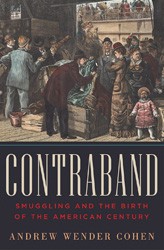By
– August 30, 2011
This excellent study by Beth Wenger originated in classroom discussions, in which some students understood that Judaism is democratic, and focuses not on why this idea is incorrect but on why the students believe it is true. Drawing on previous work on the creation of collective memory, she describes how American Jews, like other ethnic groups, “find a history that acknowledges its presence in the American nation and assigns it a meaning absent from mainstream historical accounts.” This multifaceted heritage — ascribing Judaism’s place in American society but at the same time emphasizing the compatibility between Jewish and American values — was encoded in writing poetry, literature, history books (particularly those written for children), celebrating civic holidays (like Thanksgiving, July 4, and Columbus Day), and revering historical icons like George Washington, Abraham Lincoln, and the Jewish community’s own Haym Salomon.
In contrast to other immigrant groups in the late 19th and early 20th centuries, American Jews had little nostalgia for their homelands, places of poverty and persecution, and severed themselves from their geographic roots — America, not Poland or Russia, was “home.” The book offers an important theory of ethnic history, describing acculturation as a dynamic and complex process, because “ethnic heritage does not dim in a new land but simply finds alternate routes of expression.” Wenger’s work provides a powerful framework that will hopefully guide future research but also inform a general readership about the nature of American Jewish life.
In contrast to other immigrant groups in the late 19th and early 20th centuries, American Jews had little nostalgia for their homelands, places of poverty and persecution, and severed themselves from their geographic roots — America, not Poland or Russia, was “home.” The book offers an important theory of ethnic history, describing acculturation as a dynamic and complex process, because “ethnic heritage does not dim in a new land but simply finds alternate routes of expression.” Wenger’s work provides a powerful framework that will hopefully guide future research but also inform a general readership about the nature of American Jewish life.
Susan M. Chambré, Professor Emerita of Sociology at Baruch College, studies Jewish philanthropy, social and cultural influences on volunteering, and health advocacy organizations. She is the author of Fighting for Our Lives: New York’s AIDS Community and the Politics of Disease and edited Patients, Consumers and Civil Society.




